What to Do When Fish Keep Having Babies
When you're just starting out as an aquarist trying to maintain the condition of your aquarium can be challenging.
There are so many things you need to keep an eye out for; this means there are a lot of mistakes that you can make.
A lot of the time these beginner mistakes are made because of a lack of experience.
So in today's article, we are going to look at the 21 most common aquarium mistakes and discuss how you can avoid making them.
Advertisements
Need To Know More? Get our roundup of beginners mistakes now and avoid making simple mistakes by learning from the experts.
Adding Fish Before the Aquarium Is Ready
I must admit, I too am guilty of this mistake.
You get your new aquarium and you're excited to add fish and set the tank up straight away. If you add fish before your water parameters are stable it's very likely your fish will die.
Before you add your fish, your tank must have stabilized.
This means you need to complete a nitrogen cycle and water parameters (pH, temperature, hardness) must be stable.
Only after this can fish be added to your tank.
Buying a 'Small' Aquarium
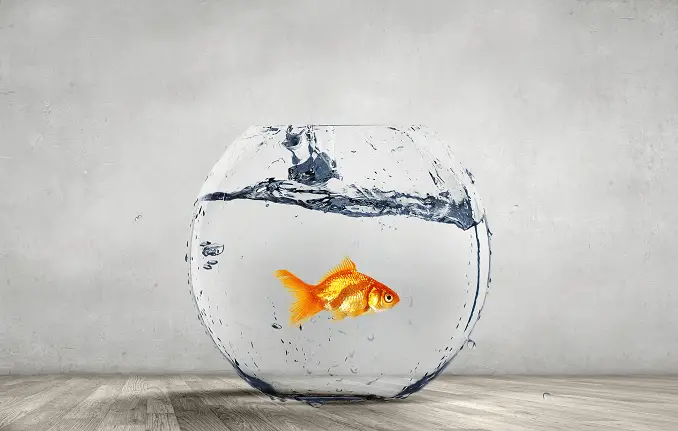 A great myth amongst beginner aquarists is that a small aquarium is easier to maintain than a larger aquarium.
A great myth amongst beginner aquarists is that a small aquarium is easier to maintain than a larger aquarium.
This is true but only to a certain extent.
I would generally recommend beginners find a tank between 30 and 60 gallons.
So why is it a mistake to start with a small/nano aquarium?
In a smaller tank, there is less water which means that the condition of the water can change incredibly quickly.
In a larger aquarium, it is far easier to maintain the water parameters.
Accidental Poisoning
Believe it or not, it's actually incredibly common for beginners to poison their fish by making the water in their aquarium toxic.
The main causes for this are:
- Failing to understand the nitrogen cycle
- Excessive feed and waste left in the tank
- Too many chemicals are used unnecessarily
Perhaps the strangest case of accidental poisoning I've come across is due to the filter being turned off at night.
Advertisements
The story goes – a beginner aquarist had their aquarium in their bedroom. The light hum of the filter disturbed them, so each evening they would turn the filter off.
Each time the filter is turned off the bacteria inside will start to die due to a lack of oxygen. This can ultimately end up killing the younger fish in your aquarium.
Not Using Live Plants
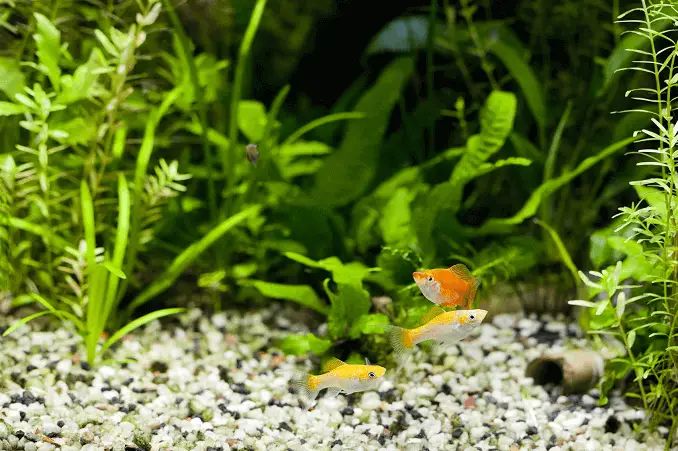 This depends on your aquarium but in a freshwater environment I would consider live plans a necessity.
This depends on your aquarium but in a freshwater environment I would consider live plans a necessity.
Most beginners see plants as complex and something which don't benefit the aquarium. This couldn't be further from the truth.
Advertisements
The biggest benefit of plants is that they help to prevent algae because they eat the same nutrients.
Live plants also help to oxygenate the water. You should be careful though and not include toxic things in your tank.
Using a Cheap Starter Filter
You will see many aquarium starter packs come with filters that are barely big enough; they will only turn the water over 2, maybe 3 times per hour. This isn't enough and it can be dangerous for your fishes' health.
As a rule of thumb, you should be looking for a filter that turns the water over at least 4 times per hour.
The good news is you can't over-filter your water so it's best to have a filter too big than too small.
Not Routinely Testing the Water
Unfortunately, aquariums aren't "set it and forget it". They require constant maintenance, especially new aquariums.
With new aquariums you should be testing the water daily, and with established aquariums monthly.
You should be checking the:
- pH levels
- ammonia
- nitrites
- nitrates
- water hardness
Also, I should note that if a fish unexpectedly dies, you should also check the water parameters.
Adding Too Many Fish
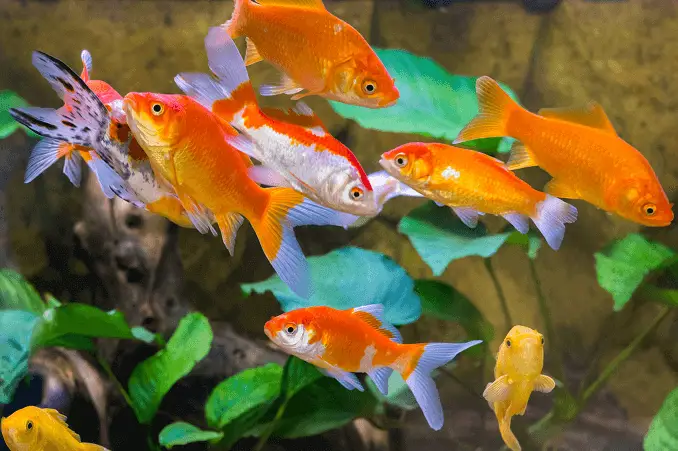 This is a very similar mistake to adding fish to a new aquarium.
This is a very similar mistake to adding fish to a new aquarium.
Adding too many fish to an aquarium at once can destabilize the water chemistry and can cause the nitrogen cycle to stall.
As a good rule of thumb only add up to 3 fish at a time to your tank.
Once you've added the fish to your tank, wait until you've completed a nitrogen cycle and then you can add more fish.
Not Understanding the Nitrogen Cycle
One of the most confusing aspects of fish keeping for a beginner is the nitrogen cycle.
Beginners tend to go one of two ways: they either completely ignore it or stress too much over it. Whilst it is slightly complex, once you get the hang of it, it isn't anything too difficult and it's just something you take in your stride.
All you need to know here is that failing to encourage and perpetuate the nitrogen cycle will result in your fish dying.
If you're looking to understand the nitrogen cycle in more depth read our article here.
Not Having Enough Patience
If you ask an aquarist what is their single most important character trait, they will unanimously agree:
Patience.
Whether it is waiting to add fish to your tank, waiting for the nitrogen cycle to complete, or waiting for the growth of beneficial bacteria, chances are you will be waiting!
You will soon learn that keeping fish requires patience by the bucket load.
Keeping Too Many Fish
Overstocking the aquarium is a very common mistake that beginners make.
It can cause problems with your filtration system and as a result, can make maintaining your water parameters near impossible.
Advertisements
You may have been told that you can stock 1" of mature fish per gallon of water. This is wrong.
Instead, you should use the 75% rule. This states that you multiple your tank capacity by 75% and this tells you how many fish you can keep.
Let me show you how this works with a 30-gallon aquarium. You multiple 30 by 75%; you end up with 22.5. This figure is the total length of mature fish you can keep. So in a 30-gallon tank you can keep up to 22.5" of mature fish.
Overfeeding
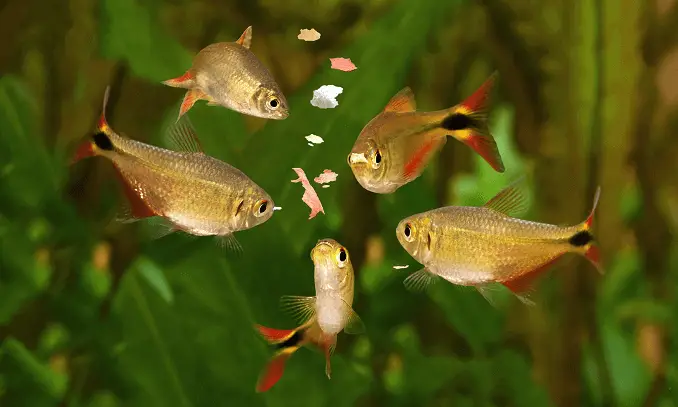 Without a doubt this is the biggest beginner mistake. It's hard to know when fish are hungry, in-fact they always appear to be hungry.
Without a doubt this is the biggest beginner mistake. It's hard to know when fish are hungry, in-fact they always appear to be hungry.
If you keep feeding your fish they will generally keep eating. This is precisely the trap beginners fall into. They keep feeding their fish because their fish keep eating.
Advertisements
This produces a lot of waste and can mess up the nitrogen cycle.
When you start, you should feed your fish once day; this will prevent over feeding. Whatever you give them they should be able to eat within five minutes.
Insufficient Water Changes
As a general rule, you should look to do a 15% water change each week.
Beginners often neglect this and think they can get away with less frequent larger water changes. Weekly water changes are crucial to keep an aquarium healthy.
Poor water conditions will cause your fish stress and this increases their susceptibility to disease.
Advertisements
Blindly Trusting Pet Stores
Let me preface this by saying there are some amazing fish stores out there. However, some larger more general pet stores have been known to provide erroneous advice.
Before you visit the store you should do at least some online research so you can establish if they know their stuff or not.
Unfortunately just because your local pet store told you that keeping an Oscar in a 30-gallon tank is ok, it doesn't make it true.
Make sure to double-check the information they tell you, either here or in a book. It doesn't matter where you check just make sure you do! A second opinion never hurts anyone.
Lack of Biological Filtration
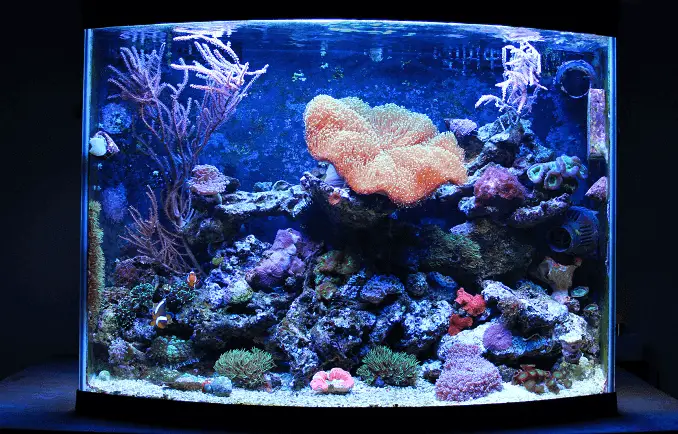 When you're getting your first aquarium it's a commonly held belief that an air-stone and a pump will provide enough filtration.
When you're getting your first aquarium it's a commonly held belief that an air-stone and a pump will provide enough filtration.
Advertisements
This is incorrect.
Regardless of the size of the aquarium, you should always have a biological filter. Small aquariums can get away with the cheaper hang-off-back style.
You need a filter to ensure the growth of beneficial bacteria.
Also as a tip, remember when cleaning the biological medium, use aquarium water and not contaminated tap water. The chlorine in tap water will destroy your live bacteria- not ideal.
Mixing Incompatible Fish
Many beginner fish keepers think that all fish get along and you can keep any species you want together.
This is wrong.
To start with many fish need different conditions to live in. At a basic level, this is freshwater vs saltwater, but also differing water parameters.
Secondly, a lot of fish are carnivorous which means they will eat other smaller fish.
In each of our breed information articles we detail the fish's compatibility with other fish. Before you add a fish to a tank you should check its compatibility to make sure it's safe to add.
Constantly Re-arranging Aquarium
Constantly moving things around in your tank can be distressing for your fish.
Don't really like that rock? Maybe it looked better in the store? How about those plants?
You should set up your tank and make sure you're happy with the layout before adding your fish.
A common 're-arrangement' I see is moving from artificial plants to real plants. This can really upset your fish. So whenever possible don't add fish to the tank until you're happy with the visual appearance and layout.
Don't Understand Freshwater Vs Saltwater Aquariums
To many non-aquarists, fish tanks are all the same. We aquarists know this couldn't be any further from the truth.
A common mistake is not understanding the difference between a freshwater and saltwater aquarium.
Advertisements
Saltwater and freshwater aquariums have their own unique set of maintenance requirements.
Make sure you understand the differences and their implications before you decide which route to take. Read our myth debunker on saltwater and freshwater aquariums for more information.
Trying to Find 'The One Way'
As a beginner, you often fall into the trap of thinking there is a single right way to do things. As a result, you end up spending a lot of your time searching for the one right way to do something.
With fishkeeping there generally isn't a single best way to do something.
You should watch, read and listen to advise and then go about finding the best way to do it for you and your aquarium.
My rule is: if it works for your aquarium then it's the right way to do it!
Not Treating Algae Appropriately
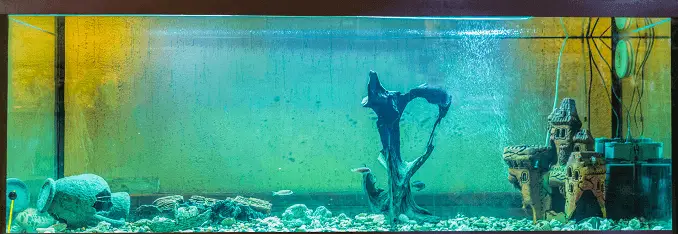 When algae first appear in your aquarium it can be quite alarming, especially if you aren't expecting it!
When algae first appear in your aquarium it can be quite alarming, especially if you aren't expecting it!
This generally happens in a beginner's tank because they aren't cleaning it enough or because the tank is left in direct sunlight.
Whatever the cause, you should remove the algae immediately. Whilst it isn't something you should worry about, if left unattended it can do harm.
To prevent it from occurring in the future you could look to add live plants in your tank.
Advertisements
Using Too Many Chemicals
One of the worst things you can do to your aquarium is flooding it with unnecessary chemicals.
The two most common reasons I hear for excessive chemicals are: to prevent illness and to stop algae growing. For instance with algae, people tend to put lots of Algaecides in their tank; often this is unnecessary.
First of all you shouldn't use Algaecides as prevention; you should only use them when you have an algae outbreak.
Secondly, you can control algae outbreaks naturally through water changes, reducing feed, and darkening the tank. This is generally also much healthier for the fish.
You should only add chemicals to your aquarium when it's absolutely necessary.
Advertisements
No Maintenance Schedule
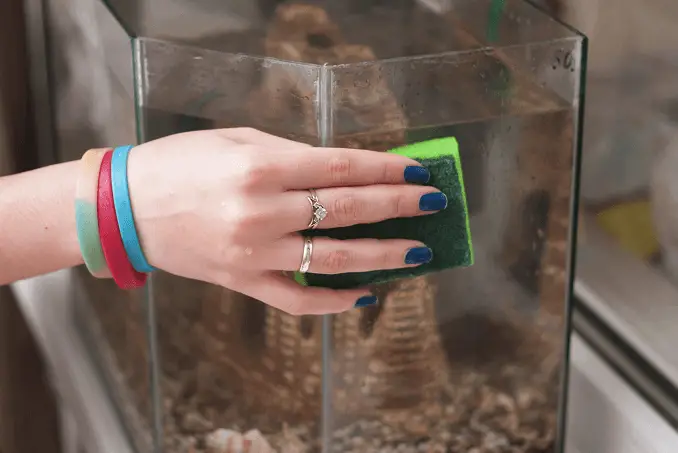 Many people have learned this lesson the hard way. When was the last time you cleaned the tank and tested the water?
Many people have learned this lesson the hard way. When was the last time you cleaned the tank and tested the water?
Having a schedule for maintenance that you stick to helps you avoid problems down the road.
Keeping a perfect aquarium requires consistent maintenance. Key maintenance activity includes:
- Water changes
- Testing water composition
- Tank and filter cleaning
You should plan to spend 1-4 hours each week on maintenance. The exact figure will mainly depend on the size of your aquarium. The bigger the tank, the more time is needed.
Summary
I hope by reading through these beginner aquarium mistakes, you can avoid making them yourself.
A lot of the time these mistakes are made just because of a lack of experience.
In my opinion, the three most common aquarium mistakes I see are:
- Incorrectly introducing fish to your aquarium.
- Not understanding the nitrogen cycle.
- Not scheduling time for aquarium maintenance.
If you understand these 3 key aquarium mistakes, you will be off to a great start.
Let us know in the comments section below what you think the biggest beginner mistake is…
What to Do When Fish Keep Having Babies
Source: https://www.fishkeepingworld.com/21-beginner-aquarium-mistakes/
0 Response to "What to Do When Fish Keep Having Babies"
Post a Comment